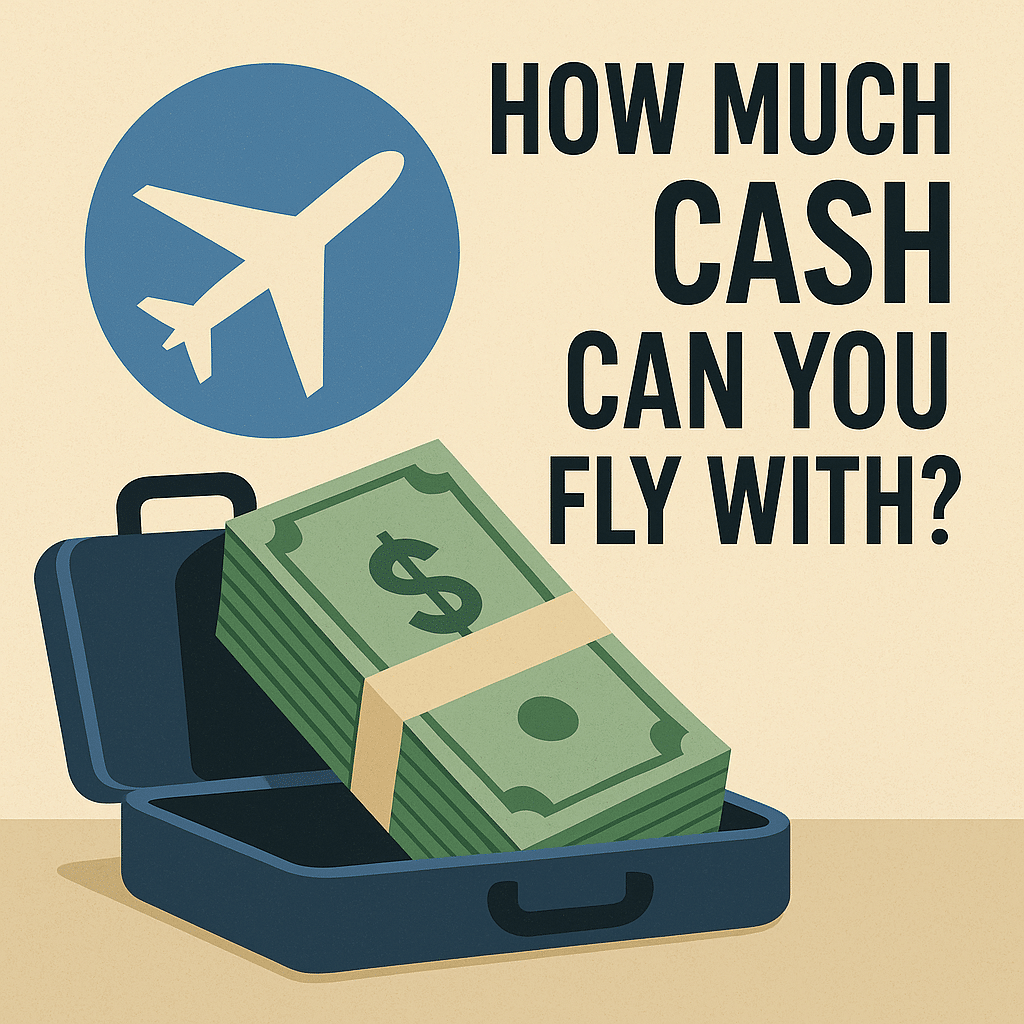
If you’re planning to travel with a large amount of cash, it’s important to know what’s legal—and what might get you flagged by airport security or law enforcement. Whether you’re flying domestically or internationally, carrying a significant amount of cash can raise suspicion and even lead to seizure, even if you haven’t committed a crime.
Here’s what you need to know about how much cash you can fly with, what the law says, and how to protect yourself from legal headaches.
Is It Illegal to Fly With a Lot of Cash?
No, it is not illegal to fly with large amounts of cash. There are no federal laws that limit how much cash you can carry on a domestic flight within the United States. However, law enforcement may question you if you’re carrying an unusually large amount, and Transportation Security Administration (TSA) officers are required to report suspicious activity—including unexplained bundles of cash.
Domestic Flights: No Limit, But Be Cautious
If you’re flying within the U.S., there’s no legal cash limit. You can bring $1,000, $10,000, or even $100,000 in your carry-on bag. But:
- TSA will likely inspect your bag if they notice a large amount of cash during screening.
- Airport police or federal agents may be called if your explanation for the cash is vague or inconsistent.
- Law enforcement may seize the money under civil asset forfeiture laws if they suspect it’s connected to criminal activity, such as drug trafficking or money laundering—even if you’re never charged with a crime.
Pro Tip: If you’re carrying more than a few thousand dollars, bring documentation (like a bank withdrawal receipt or proof of sale) and be ready to explain why you have the cash.
International Flights: $10,000 Reporting Requirement
Flying internationally? The rules change.
- If you are leaving or entering the United States with more than $10,000 in cash, you must report it to U.S. Customs and Border Protection (CBP).
- This includes cash, traveler’s checks, money orders, and other monetary instruments.
- You’ll need to complete FinCEN Form 105 before travel or at the port of entry.
Failure to report cash over $10,000 can result in:
- Seizure of your funds
- Civil penalties
- Potential criminal charges
What Happens If My Cash Gets Seized?
If TSA, CBP, or law enforcement seizes your money, it doesn’t mean it’s gone forever—but getting it back is an uphill battle. You may receive a notice of seizure and have the right to file a claim. But you’ll need to prove the money came from a legitimate source.
This is where a criminal defense or civil asset forfeiture attorney can help you fight to recover your money and protect your rights.
Common Scenarios That Trigger Scrutiny
Some situations that commonly result in cash seizures at airports include:
- Traveling with vacuum-sealed bundles of cash
- Giving inconsistent stories about where the money came from
- Carrying large amounts of cash in checked luggage
- Being flagged on a watchlist or drug courier profile
Even innocent travelers have had their cash seized simply because they didn’t know the rules or how to properly document the funds.
Protect Yourself: What You Can Do
- Don’t check large amounts of cash—keep it in your carry-on.
- Separate bills and avoid unusual packaging (like rubber-banded stacks).
- Have proof of the source and purpose of the money.
- Know your rights—you do not have to consent to a search or interrogation without a warrant or lawyer present.
- Call a lawyer immediately if your money is seized or if you’re detained for questioning.
Cash seizures at airports can lead to criminal investigations and formal charges. What starts as a TSA screening can escalate into allegations of drug-related offenses, financial crimes or fraud, or other federal violations. If you are carrying a large amount of cash and encounter law enforcement, understanding your criminal defense rights — including your Fifth Amendment right to remain silent — can make the difference between keeping your money and losing it.
Need Legal Help After a Cash Seizure?
If your cash was seized at an airport, you don’t have to fight the system alone. At Southern Maryland Criminal Defense, we help travelers and residents protect their rights and recover wrongfully seized funds. Whether you were flying out of BWI, National, or Dulles, our firm can help.
Contact us today for a confidential consultation:
👉 Schedule Your Consultation
